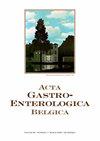肾移植后终末期回肠炎:克罗恩病还是其他?病例报告及文献回顾。
IF 1.5
4区 医学
Q2 Medicine
Acta Gastro-Enterologica Belgica
Pub Date : 2019-01-01
引用次数: 0
摘要
肾移植后发现终末期回肠炎可引起诊断挑战。由于在免疫抑制治疗下克罗恩病不太可能发展,因此只有在排除感染性疾病和药物相关肠道毒性后才能考虑这种诊断。确定终末期回肠炎的根本原因往往受到缺乏特定诊断测试或缺乏敏感性的阻碍。我们报告了三例肾移植后因不同病因导致的终末期回肠炎。随后,我们描述的特点,可以帮助作出鉴别诊断。本文章由计算机程序翻译,如有差异,请以英文原文为准。
Terminal ileitis after kidney transplantation : Crohn's disease or other? Case reports and literature review.
The finding of a terminal ileitis after kidney transplantation can cause a diagnostic challenge. Because the development of Crohn's disease under immunosuppressive therapy is unlikely, this diagnosis should only be considered after exclusion of infectious disease and drug-related intestinal toxicity. Defining the underlying cause of terminal ileitis is often hampered by a shortage of specific diagnostic tests or their lack of sensitivity. We present three patients with terminal ileitis after kidney transplantation resulting from different etiologies. Subsequently, we describe the characteristics that can help to make the differential diagnosis.
求助全文
通过发布文献求助,成功后即可免费获取论文全文。
去求助
来源期刊

Acta Gastro-Enterologica Belgica
医学-胃肠肝病学
CiteScore
2.80
自引率
20.00%
发文量
0
审稿时长
>12 weeks
期刊介绍:
The Journal Acta Gastro-Enterologica Belgica principally publishes peer-reviewed original manuscripts, reviews, letters to editors, book reviews and guidelines in the field of clinical Gastroenterology and Hepatology, including digestive oncology, digestive pathology, as well as nutrition. Pure animal or in vitro work will not be considered for publication in the Journal. Translational research papers (including sections of animal or in vitro work) are considered by the Journal if they have a clear relationship to or relevance for clinical hepato-gastroenterology (screening, disease mechanisms and/or new therapies). Case reports and clinical images will be accepted if they represent an important contribution to the description, the pathogenesis or the treatment of a specific gastroenterology or liver problem. The language of the Journal is English. Papers from any country will be considered for publication. Manuscripts submitted to the Journal should not have been published previously (in English or any other language), nor should they be under consideration for publication elsewhere. Unsolicited papers are peer-reviewed before it is decided whether they should be accepted, rejected, or returned for revision. Manuscripts that do not meet the presentation criteria (as indicated below) will be returned to the authors. Papers that go too far beyond the scope of the journal will be also returned to the authors by the editorial board generally within 2 weeks. The Journal reserves the right to edit the language of papers accepted for publication for clarity and correctness, and to make formal changes to ensure compliance with AGEB’s style. Authors have the opportunity to review such changes in the proofs.
 求助内容:
求助内容: 应助结果提醒方式:
应助结果提醒方式:


